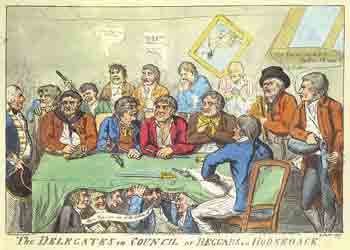Background
Valentine Joyce was born in Elizabeth Castle in 1769 and baptised there on 13 August of that year. He was the son of Valentine Joyce, one of the Corps of Invalids stationed in Jersey, and Elizabeth Lamb. He did not remain in the island but was a tobacconist in Belfast for some time before joining the Navy. By 1789 he had undoubtedly proved himself a capable seaman and had risen to be quartermaster's mate on HMS Royal George
The mutiny
The mutiny at Spithead (an anchorage near Portsmouth) lasted from 16 April to 15 May 1797. Sailors on 16 ships in the Channel Fleet, commanded by Admiral Lord Bridport, protested at the living conditions aboard Royal Navy vessels and demanded a pay raise.
Seamen's pay rates had been established in 1658, and because of the stability of wages and prices, they had still been reasonably competitive as recently as the Seven Years' War, 40 years earlier. however, high inflation during the last decades of the 18th century severely eroded the real value of the pay. At the same time the practice of coppering the bottoms of hulls, starting in 1761, meant that British warships no longer had to return to port frequently to have their hulls scraped, and the additional time at sea significantly altered the rhythm and difficulty of seamen's work. The Royal Navy had not yet made adjustments for any of these changes, and was slow to understand their effects on its crews. Finally, the new wartime quota system meant that there were a large number of landsmen from inshore, who did not mix well with the career seamen (volunteers or pressed men) and led to discontented ships' companies.
The mutineers were led by elected delegates and tried to negotiate with the Admiralty for two weeks, focusing their demands on better pay, the abolition of the 14-ounce purser's pound (the ship's purser was allowed to keep two ounces of every pound of meat as a perquisite), and the removal of a handful of unpopular officers. Neither flogging nor impressment was mentioned in the mutineers demands. The mutineers maintained regular naval routine and discipline aboard their ships (mostly with their regular officers), allowed some ships to leave for convoy escort duty or patrols, and promised to suspend the mutiny and go to sea immediately if French ships were spotted heading for English shores.
Because of mistrust, especially over pardons for the mutineers, the negotiations broke down, and minor incidents broke out with several unpopular officers sent to shore and others treated with signs of deliberate disrespect. When the situation calmed, Admiral Lord Howe intervened to negotiate an agreement that saw a Royal pardon for all crews, reassignment of some of the unpopular officers, and a pay raise and abolition of the purser's pound. Afterwards, the mutiny was to become nicknamed "breeze at Spithead".
Joyce as leader
Although not all historians accept this, the Rev George Balleine in his Biographical Dictionary of Jersey indicates that Joyce, although not the instigator of the mutiny, became its leader after two delegates were sent from each ship to form what became known as the "general assembly".
- "From the first meeting Joyce took the lead, and in all future correspondence with the Admiralty always signed first. The policy of the Delegates was by no means extreme. Strict discipline was to be maintained, watches kept, respect shown to officers. Only the big ships were to remain anchored. Frigates and sloops required for convoys were to obey orders. Trade must not be hampered. On the other hand, the Delegates took over the command of the Fleet.
Negotiations were held and concessions were offered by the Admiralty. Joyce demanded that the increase in pay offered must be enshrined in an Act of Parliament and the King's Pardon secured for all the mutineers. The pardon arrived, but Parliament was slow to enact the required legislation, so the mutiny flared up again. Joyce intervened when a First Lieutenant who had shot a gunner on HMS London was about to be hanged by the men. He flung his arms around him saying:"If you hang this young man, you must hang me".
Admiral Lord Howe, a popular, aged officer, was sent to Portsmouth after Parliament hurried to enact a Bill and he dealt direct with Joyce. Great reforms were brought about by the mutiny and 59 officers, including an Admiral and four Captains, were dismissed by Howe. None of the mutineers was victimised and Joyce retained his position as Master's Mate.
